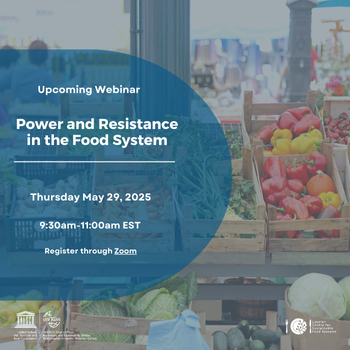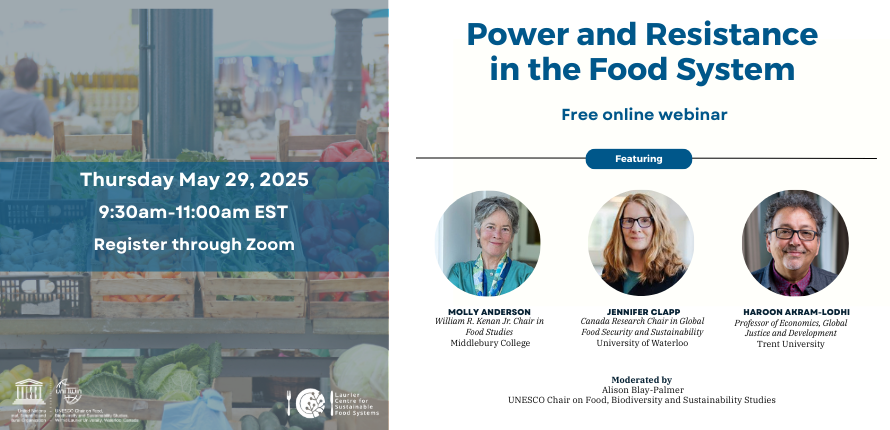We use cookies on this site to enhance your experience.
By selecting “Accept” and continuing to use this website, you consent to the use of cookies.

The UNESCO Chair on Food, Biodiversity, and Sustainability Studies, supported by the Laurier Centre for Sustainable Food Systems invites you to attend an upcoming webinar on Power & Resistance in the Food System. Featured speakers Molly Anderson and Jennifer Clapp will draw from their recent publications to unpack contrasting narratives of power and examine how communities, movements, and institutions are actively resisting corporate control and consolidation in our food systems. Discussant Haroon Akram-Lodhi will provide a global perspective, contextualizing these dynamics within the current shifting political and economic landscape. This critical conversation will discuss lever points for change and envision pathways to more just, resilient, and sustainable food systems.
Join us online, Thursday May 29, 2025 from 9:30am-11:00am EST
Register through Zoom
The event will be recorded and made available to registered attendees. If you have any questions, please contact emiltenburg@wlu.ca

Every year, hundreds of billions of dollars’ worth of farm machinery, fertilizer, seeds, and pesticides are sold to farmers around the world. Although agricultural inputs are a huge sector of the global economy, the lion’s share of that market is controlled by a relatively small number of very large transnational corporations. The high degree of concentration among these agribusiness titans is striking, considering that just a few hundred years ago agricultural inputs were not even marketed goods. In her new book, Titans of Industrial Agriculture (MIT Press, 2025), Dr. Jennifer Clapp explains how we got from there to here, outlining the forces that enabled this extreme concentration of power and the entrenchment of industrial agriculture.
Dr. Clapp reveals that the firms that rose to the top of these sectors benefited from distinct market, technology, and policy advantages dating back a century or more that enabled them to expand their businesses through mergers and acquisitions that made them even bigger and more powerful. These dynamics matter because the firms at the top have long shaped industrial farming practices that, in turn, have generated enormous social, ecological, and health impacts on the planet and the future of food systems. Beyond analyzing how these problems have arisen and manifested, the book examines recent efforts to address corporate power and dominance in food systems and assesses the prospects for change.
Transforming food systems is essential to safeguarding human and planetary health, yet the process remains highly contested and shaped by competing narratives. While broad agreement exists on the need for change, there is far less consensus on how that change should happen, or who should lead it. These tensions make it all the more critical to understand the stories we tell about food systems and the power behind them.
In Transforming Food Systems: Narratives of Power, (Routledge, 2024) Dr. Molly Anderson examines food system transformation through the lens of narrative, revealing how these stories function as informal theories of change. Drawing on political economy and systems approaches, she explores how power structures shape access to healthy and culturally appropriate food, and how different visions of agroecology, food sovereignty, and technological innovation compete to define the future. Through interviews and speeches from policymakers, philanthropists, academics, food industry workers, and activists, Dr. Anderson presents a wide range of perspectives and critically assesses their transformative potential. Her analysis not only highlights which pathways offer real promise for sustainable food systems, but also challenges those that fall short. This book is a vital resource for students, scholars, and policymakers seeking to create a food-secure, socially just, and environmentally sustainable future.
Jennifer Clapp is a Professor and Canada Research Chair in Global Food Security and Sustainability in the School of Environment, Resources and Sustainability and the Balsillie School of International Affairs at the University of Waterloo. She has published widely on the global governance of problems that arise at the intersection of the global economy, food security and food systems, and the natural environment. Professor Clapp is a member of the International Panel of Experts on Sustainable Food Systems (IPES-Food). From 2019-2023, she served on the Steering Committee of the High-Level Panel of Experts on Food Security and Nutrition (HLPE-FSN) of the United Nations Committee on World Food Security (CFS) and was Vice-Chair of that body from 2021-2023.
Molly Anderson is a Research Associate Professor at UVM and directs the Academic Program in Food Studies at Middlebury College in Vermont, where she teaches about hunger and food security, fixing food systems, and sustainability. She is especially interested in multi-actor collaborations for sustainable food systems, sustainability metrics and assessment, food system resilience, human rights in the food system, and the right to food in the US and other industrialized countries. She is also interested in bridging interests and concerns of academicians, community-based activists and social movements. She is involved in food system reform and planning at the local, state and regional scales; participates in the regional Food Solutions New England network and the national Inter-Institutional Network for Food, Agriculture & Sustainability; and is a member of the International Panel of Experts on Sustainable Food Systems (IPES-Food).
Haroon Akram-Lodhi is a Professor of Economics, Global Justice and Development at Trent University, Peterborough, Canada, and he is an Associate Editor of Feminist Economics. The focus of Haroon Akram-Lodhi's research is on the engendered political economy of agrarian change in the countries of the global South, on the economic dimensions of gender relations, and on the political ecology of gendered sustainable rural livelihoods in contemporary low- and middleincome countries. He is currently a Gender and Livelihoods Advisor to the World Food Programme, and has acted as an advisor to UN Women, UN Environment, UNDP and the United Nations Capital Development Fund. Haroon Akram-Lodhi has lived, taught, and conducted research in numerous countries, published extensively in peer-reviewed journals, and has received honorary appointments at universities in Canada, the US, and the UK.
Alison Blay-Palmer, the UNESCO Chair on Food, Biodiversity, and Sustainability Studies is the founding Director of the Centre for Sustainable Food Systems and a Professor in Geography and Environmental Studies at Wilfrid Laurier University. Alison collaborates with academics and practitioners across Canada and internationally including partners in Australia, Brazil, France, India, Kenya, Mexico, South Africa, Sri Lanka, Uganda and the United States. Alison has been a member of the Royal Society of Canada’s College of New Scholars, Artists and Scientists since 2016. She is the Principal Investigator on Food Learning and Growing (FLOW) which includes research and monitoring over 5 years in eight territorial food systems. Her research on sustainable food systems, biodiversity and community resilience builds on civil society engagement and innovative governance.